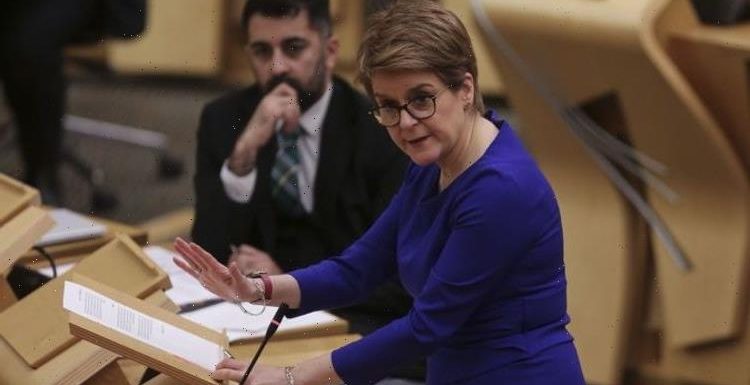
Steve Brine clashes with SNP MSP over Cambo oil field
We use your sign-up to provide content in ways you’ve consented to and to improve our understanding of you. This may include adverts from us and 3rd parties based on our understanding. You can unsubscribe at any time. More info
Cambo is one of the UK’s largest undeveloped offshore oilfields and lies in Scotland. For months, Ms Sturgeon was accused of being indecisive over Cambo, as protestors gathered to stop the oil field from being operational.
Finally in November, as COP26 ended in Glasgow, Ms Sturgeon voiced her strongest opinion so far on the proposed development, saying: “I don’t think that Cambo should get the green light.”
It comes after Ms Sturgeon previously threw her weight behind oil and gas projects in Scotland.
She even said: “If we just basically draw a line and take a sort of axe to oil and gas right now, whatever the climate motivations of that might be, all we will end up doing is making ourselves more dependent on imported oil and gas.”
The move at COP was criticised by many, including former First Minister Alex Salmond, who believed that Ms Sturgeon’s stance on the controversial project could sink the case for independence and cost the SNP thousands of votes.


At COP26, Ms Sturgeon had no formal role, which political commentator Euan McColm claimed was a deliberate attempt by Prime Minister Boris Johnson to sideline the leader of the SNP.
Despite this, she positioned herself as a climate leader throughout the conference as she made speeches, held press conferences, and met key figures like US President Joe Biden and climate activist Greta Thunberg.
Mr McColm said: “The First Minister’s U-turn over the Cambo oil field tells us that she sees mileage in continuing to play this particular part.”
While this statement will undoubtedly enhance her reputation as a climate friendly leader, critics argue that this could alienate her from her long time voter base, many of whom want an independent Scotland.

A number of SNP politicians and voters disagree with her stance, as they saw the benefits of Scottish oil as a good argument for Scottish independence.
McColm argues: “These nationalists surely support what Sturgeon has described as a “just transition” from an economy powered by oil to one that is carbon neutral.
“It’s just that they – quite correctly – think Sturgeon has missed out the transition part.”
Until Scotland is ready for a complete transition, it will still be heavily reliant on fossil fuels, which it will likely now have to source from outside the UK.
DON’T MISS:
Tories admit ‘raucous’ Christmas party took place last December [REVEAL]
Conman who linked to sports stars kills himself by drinking acid [INSIGHT]
Covid LIVE: Chris Whitty issues horror Omicron warning [LIVE]

Mr McColm argues that the only thing Ms Sturgeon’s statement has achieved is to drive out oil companies that will now look for opportunities elsewhere.
The stance may also be politically dangerous for the SNP with as many as 100,000 Scottish jobs which are considered to depend on the North Sea.
Alex Salmond compared this position to former UK Prime Minister Margaret Thatcher’s abandonment of coal-mining communities.
He said: “It would be akin to Margaret Thatcher, having closed the pits, then campaigning for votes in the old mining areas of Cowdenbeath and Kelty.”

In 1984, there were 170 working collieries in Britain, employing more than 190,000 people – however, by 2015, they had all closed.
Mrs Thatcher’s announcement that she planned to close 20 pits led to the year-long miners’ dispute and helped to demonise the Tory PM in the eyes of many working-class Scots.
Mr McColm concluded: “If the project is scrapped, the quest to become carbon neutral will not be accelerated.
“Nicola Sturgeon might find once-loyal supporters feel she has abandoned them in the name of winning a few positive headlines.”
Source: Read Full Article